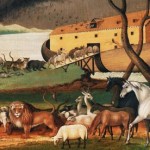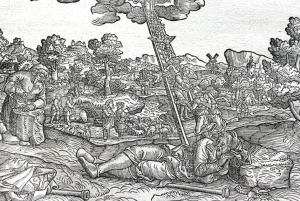 On Wednesday night, my Hebrew class translated Genesis 41—the dead center of the story of Joseph. The word plays in Hebrew are hilarious and skilled, the storyline suspenseful yet playful. In one verse, the seven scrawny cows of Pharaoh’s dream devour seven pleasantly plump cows, but you can’t tell because the skinny cows come to “the innards” (kidneys, livers, tripe—food thought to be delicacies by everyone but me during my Cambridge days), gobble them up, and stay scrawny. As one student puzzled: a skinny cow eats a whole fat cow, and no change? (Frankly, the whole discussion made me crave a hamburger from Dick’s, a popular local Seattle haunt.)
On Wednesday night, my Hebrew class translated Genesis 41—the dead center of the story of Joseph. The word plays in Hebrew are hilarious and skilled, the storyline suspenseful yet playful. In one verse, the seven scrawny cows of Pharaoh’s dream devour seven pleasantly plump cows, but you can’t tell because the skinny cows come to “the innards” (kidneys, livers, tripe—food thought to be delicacies by everyone but me during my Cambridge days), gobble them up, and stay scrawny. As one student puzzled: a skinny cow eats a whole fat cow, and no change? (Frankly, the whole discussion made me crave a hamburger from Dick’s, a popular local Seattle haunt.)
Enough small talk. It’s time to talk turkey—or cows at least.
After Joseph interprets his dream about the seven skinny cows who ate the plump cows, Pharaoh asks,
Can we find anyone else like this—one in whom is (the) spirit of God?
Pharaoh then nimbly answers his own question:
Since God is making known all of this to you, there is no one discerning and wise like you.
Pharaoh’s question and answer tie the spirit of God and wisdom at the hip.
How did Joseph come to be seen as a person with the spirit of God in him? How did he get hold of wisdom? And how do we, by extension, come to be recognized as people full of the spirit of God? How do we come to be known as people of extraordinary wisdom?
It’s tempting to attribute Joseph’s clairvoyant abilities to an onrush of the spirit, a charismatic endowment, a pop of inspiration that gives him extraordinary insight. Nothing could be further from the truth. Nothing. No rush. No pop. No baptism in the holy spirit.
This isn’t the sort of experience that happens on occasion during a particularly moving worship service or during a retreat or on a mountaintop. This is the spirit that resides within Joseph—and us—over the course of his lifetime. The spirit of God within Joseph was the source of wisdom and discernment that would, from Pharaoh’s perspective, qualify Joseph in the long run to function as second-in-command.
How then did the spirit give Joseph the wisdom to interpret dreams? Through practice. Through training. His own youthful dream (Genesis 37:5-11) was followed later in his life by the dreams of the cup bearer and butler (40:1-23), which he interpreted spot on. Later still he interpreted Pharaoh’s dream about the seven fat and lean cows (41:1-36). In other words, Joseph had extensive experience in the art of dream interpretation. He plied his unpaid trade. He didn’t interpret dreams because the holy spirit put him in a trance or gave him some magnificent revelation or trounced his consciousness with a single, salient revelation. He interpreted dreams because he learned how to—from youth on.
Joseph was a dreamer by nature, but he was an interpreter of dreams by practice.
What about his capacious gifts of administration? They weren’t his because of the descent of the dove, the overpowering of the spirit. Nope. His advice to set aside a fifth of the grain during the good years to guard against the coming famine was the product of experience, the payoff of practice. Joseph was such an able administrator over both Potiphar’s house and his fellow prisoners that neither Potiphar nor the chief jailer had to pay any attention to what lay under Joseph’s care (39:6; 39:23). By the time Pharaoh identifies Joseph as one in whom is (the) spirit of God, Joseph has proved himself in both dream interpretation and administration. It’s this combination of dream interpretation and sage advice that prompts Pharaoh to ask whether there is anyone else like him, one in whom is (the) spirit of God.
I think too often Christians believe the holy spirit begins its best work when the mind shuts off. We say things like, “I’ll leave that to the spirit,” which means I won’t work hard with every ounce of energy I can muster, every discipline I can develop.
The story of Joseph puts the lie to this belief. It’s not despite Joseph’s abilities but because of them that Pharaoh recognizes the wisdom, discernment and spirit of God in Joseph. Joseph’s is a life lived well, wisdom learned well, interpretation practiced well, administration exercised well, discernment executed well.
The story of Joseph teaches us that the spirit of God is not an excuse to be lazy, a reason to be lax, a rationale to “let the spirit do the work.” The spirit of God is present primarily in a life of virtue and a path of discipline. The spirit is a resource deep within us out of which we learn, labor, think, plan, and lead, prompting those around us, even those outside the faith, to wonder, “Can we find anyone else like this—one in whom is (the) spirit of God?”
















